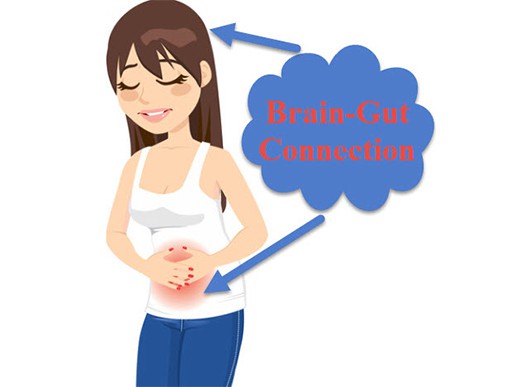What Is The Brain-Gut Signal?
In the past, doctors used to dismiss Irritable Bowel Syndrome (IBS) sufferers by telling them that their dysfunction existed only in their brain. Well, we can say that they were right in their diagnosis, in a manner of speaking. IBS is all in the sufferer’s brain, or more specifically, in their brain-gut connection. The brain has a direct connection to our stomach; just thinking about your favorite food will have you salivating in minutes. When you ingest food, it has to make a 9 metres (30 foot) long journey through different organs in your digestive track. Throughout this journey, there is continuous communication between your digestive system and your brain, via the nervous system. This constant communication is what lets your brain know when the stomach is full, and this is also why you feel nauseated when you are stressed.
The Gut Is Also Called Second Brain
The enteric nervous system (ENS) is one of the main area of the nervous system and is embedded in the lining of the digestive tract and extends from the esophagus down to the anus. It consists of 400 million neurons that governs the function of the gastrointestinal system. The ENS has been named by Dr Michael Gershon the “Second Brain”.
The ENS is considered a ‘second brain’ because it can work independently and autonomously, without any input from the ‘real’ brain. The ENS is able to control the movement and absorption of food throughout the intestines on its own. When we feel ‘butterflies in stomach’ this is the second brain communicating with the brain and sending signals also to do with good or bad feelings, stress, fear etc. It creates serotonin as in the brain. Serotonin is a chemical which amongst other function is considered responsible for maintaining mood balance.
Problems with the Brain-Gut Signal
A dysfunction in the brain-gut connection can have negative effects on your stomach. When the neurons transporting the messages between the brain and your stomach miscommunicate, because of psychological or mental health issues, it has an adverse impact on your gastrointestinal system. For example, research suggests that a person’s stomach produces less acid when they are experiencing high levels of stress, thereby impairing its ability to digest food properly. This is the reason why dysfunction in the brain-gut connection is considered to be one of the main causes of irritable bowel syndrome.
What can be done to improve the brain-gut signal?
You may be wondering about a course of action or treatment plan to improve the brain-gut connection so you can experience some relief from gastrointestinal issues, like IBS. For those who want to improve the brain-gut connection, there are a few things that can be done and although I am always for the natural way, when I can, if I can, the below list also contains medication, which some doctor prescribe and that in some cases have been found helpful.
Medication
Gastroenterologists (digestive system specialists), sometimes prescribe antidepressants for people who are suffering from IBS, because apparently this medication can help relieve many of the symptoms that aggravate IBS by helping ‘develop’ better communication between the gut and the brain.
Hypnotherapy
Some studies have proven that medical hypnotherapy is one of the best treatments for IBS. A certified hypnotist will treat you with hypnotherapy to relax and sooth your mind, so your symptoms can be reduced. Contrary to what most people believe, the therapist has no control over the patient. The person is completely aware of what transpires during the session and after it.
CBT
Cognitive behavioral therapy can help people with brain-gut issues by reframing their way of thinking. It can help them modify their behavior and learn coping skills to manage stress, anxiety and depression. After you start this therapy, you will feel an improvement in your IBS symptoms.
Conclusion
By looking at the information above, it is quite evident that there is a strong connection between IBS and our brain and we cannot possibly think about treatment for IBS, without thinking about our brain’s health. You can get more information regarding IBS and ways to improve the symptoms within this Low-FODMAP blog.
References:
Psychology Today – Your Backup Brain



Mind over matter! Most people with IBS actually have some form of anxiety or panic issues. It is so common with IBS suffers, that some doctors believe stress is the culprit, not food itself. I know this isn’t the case with everyone, but is sure is food for thought. Stress is very hard on the body.
It seems hard to believe, but it is incredible what a big impact emotional tension and stress have on our physical body, hence causing us to become more sensitive to what we eat and creating all the food intolerances.
Hmmmm very interesting! It makes so much sense that the psychological and physical affect one another. My brother suffers from IBS, but I don’t know if he’d ever try hypnotherapy or CBT.
Thanks for your comment Heather. I hope your brother can keep his IBS under control. These are only some suggestions, a visit to the doctor and eventually a referral to a dietitian is the best path to follow.